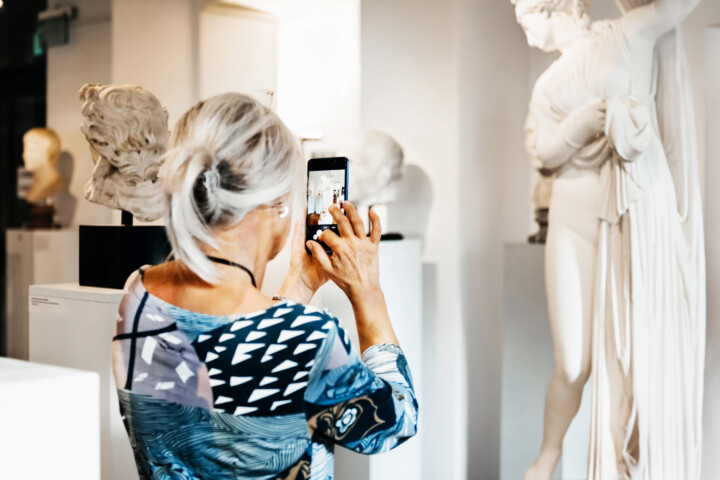22 August 2022
In one of the biggest shifts in how people access culture in a generation, three-quarters of respondents reported accessing cultural content more than 3 times a week in their home via tech such as tablets, laptops, phones and e-readers. Significantly, 63% of people surveyed are downloading cultural content for free, with 44% paying for content 1-2 times a month.
The survey ‘Accessing and valuing cultural content’ provides greater understanding of how digital devices and technology are helping reduce levels of cultural exclusion but this is coming at a cost to creators such as artists, performers, writers, and musicians that are not paid fairly or at all when they create cultural content that is shared.
With more than 2.1m people working in the cultural and creative industries contributing an annual £116bn to the UK economy, the results published today show public support for new ways to pay creators for the work they make. 72% per cent of people support artists, performers and creative workers being paid when their work is shared digitally, whilst 67% of respondents supported the government being open to new initiatives, which would help sustain the UKs cultural and creative industries.
As the cultural landscape shifts and more people are downloading and watching cultural content through their devices, it is significant that only 5% of people surveyed think that every creator is paid for their creative work that is available online to be streamed, shared, or downloaded. However, 77% of our survey respondents are keen that technology companies be open to new initiatives to support creators of works that they access via shareable tech.

Caroline Dinenage MP, said: “As the UK rebuilds post-pandemic and we seek to cement the UKs reputation as a creative economy for all, it is time that we look at how to collaborate across industries to ensure everyone and every sector can thrive in the long term. It is important that government looks at workable and sustainable opportunities that Europe and the rest of the world have put in place that the UK could feasibly replicate to ensure our country remains at the forefront of the global creative economy.”
Gilane Tawadros, Chief Executive, DACS said: “Most British artists earn less than the minimum wage, and many were locked out of the cultural recovery fund as freelance workers. As the UK seeks new ways of investing in and growing its economy post-covid and post-Brexit, it is time to ask how government and industry can collaborate, and how cultural creators can share in the success of our technology companies.”
‘Accessing and valuing cultural content’ was conducted in June 2022.
Image credit: Woman Taking Picture Of Classical Sculpture, by Tom Werner @getty images
Find out more:
22 August 2022
In one of the biggest shifts in how people access culture in a generation, three-quarters of respondents reported accessing cultural content more than 3 times a week in their home via tech such as tablets, laptops, phones and e-readers. Significantly, 63% of people surveyed are downloading cultural content for free, with 44% paying for content 1-2 times a month.
The survey ‘Accessing and valuing cultural content’ provides greater understanding of how digital devices and technology are helping reduce levels of cultural exclusion but this is coming at a cost to creators such as artists, performers, writers, and musicians that are not paid fairly or at all when they create cultural content that is shared.
With more than 2.1m people working in the cultural and creative industries contributing an annual £116bn to the UK economy, the results published today show public support for new ways to pay creators for the work they make. 72% per cent of people support artists, performers and creative workers being paid when their work is shared digitally, whilst 67% of respondents supported the government being open to new initiatives, which would help sustain the UKs cultural and creative industries.
As the cultural landscape shifts and more people are downloading and watching cultural content through their devices, it is significant that only 5% of people surveyed think that every creator is paid for their creative work that is available online to be streamed, shared, or downloaded. However, 77% of our survey respondents are keen that technology companies be open to new initiatives to support creators of works that they access via shareable tech.

Caroline Dinenage MP, said: “As the UK rebuilds post-pandemic and we seek to cement the UKs reputation as a creative economy for all, it is time that we look at how to collaborate across industries to ensure everyone and every sector can thrive in the long term. It is important that government looks at workable and sustainable opportunities that Europe and the rest of the world have put in place that the UK could feasibly replicate to ensure our country remains at the forefront of the global creative economy.”
Gilane Tawadros, Chief Executive, DACS said: “Most British artists earn less than the minimum wage, and many were locked out of the cultural recovery fund as freelance workers. As the UK seeks new ways of investing in and growing its economy post-covid and post-Brexit, it is time to ask how government and industry can collaborate, and how cultural creators can share in the success of our technology companies.”
‘Accessing and valuing cultural content’ was conducted in June 2022.
Image credit: Woman Taking Picture Of Classical Sculpture, by Tom Werner @getty images
